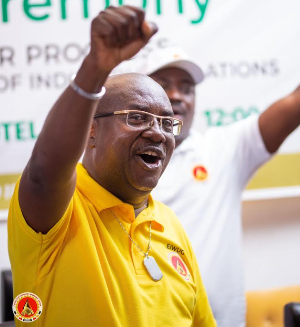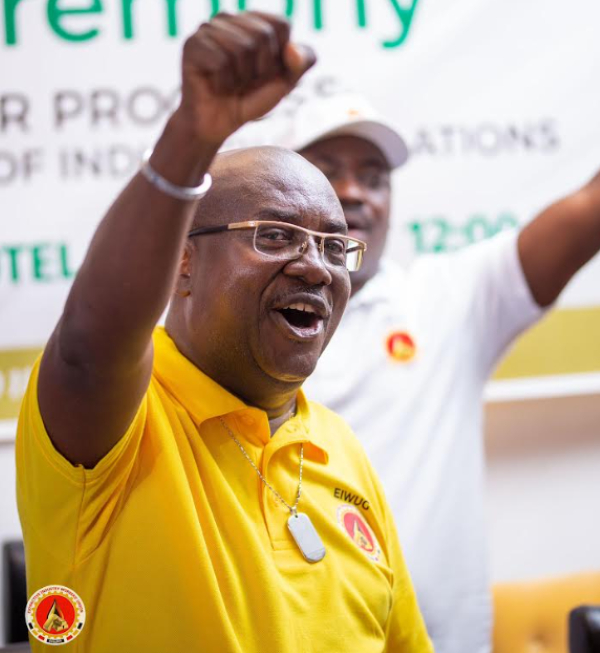 Victor Asare Gyapong, Executive Director of the Extractive Industry Workers’ Union Ghana
Victor Asare Gyapong, Executive Director of the Extractive Industry Workers’ Union Ghana
In a moment that pierced through ceremonial formalities and struck at the heart of lived realities, Victor Asare Gyapong, Executive Director of the Extractive Industry Workers’ Union Ghana (EIWUG) of Ghana Federation of Labour, made a fervent appeal that echoed far beyond the walls of the Eusbett Hotel conference hall, “Fix the Sunyani–Kenyasi road and fix it now.”
With these resolute words, Gyapong shifted the tone of the union’s inaugural address from celebration to urgent advocacy. What began as a proud showcase of institutional growth and worker solidarity became a clarion call to the national conscience.
The road in question, once a vital one-hour connection between Sunyani and the mining hub of Kenyasi, has now degenerated into a nearly two-hour ordeal, a symbol of neglect with tangible, compounding costs.
“This is not just an infrastructure issue,” he declared. “It’s a human issue. A development issue. A productivity issue,” said Asare.
A road that reflects a nation’s priorities
In a country where extractive industries remain a pillar of economic performance, the irony is inescapable. The very arteries that fuel Ghana’s economic engine are themselves fractured.
The Sunyani–Kenyasi road is more than a regional route; it is a lifeline for workers, businesses, schools, clinics, and families. Its degradation tells a story not only of potholes and delays but of deepening inequalities and missed opportunities.
Gyapong drew specific attention to the invisible toll the failing road inflicts: prolonged exposure to dust and unsafe driving conditions, fatigue, delayed response to emergencies, and an overall drop in worker morale and productivity. For female workers, many of whom carry the dual burden of employment and family caregiving, the extended travel time adds another layer of hardship.
Infrastructure is development policy in action
The Executive Director’s plea was not just a call for asphalt and machinery; it was a demand for equity, for efficient governance, for accountability.
He called upon the Ministry of Roads and Highways, the Bono Regional Coordinating Council, and all relevant state agencies to prioritize the road not just as a logistical concern, but as a marker of national development policy in action.
His voice joins a growing chorus across Ghana that recognizes infrastructure not as a luxury, but as the groundwork of a fair and functional society.
A test of political will
Fixing the Sunyani–Kenyasi road is a litmus test; not just of engineering capability, but of political will. It challenges decision-makers to look beyond electoral cycles and focus on the structural needs of communities driving Ghana’s economic growth.
It demands that the aspirations of workers be matched with investments that protect their health, time, and dignity.
As Mr. Gyapong reminded the nation, this is not about convenience; it is about justice.
The Message is Clear: The time is now
Let this not be another appeal lost in bureaucratic echo chambers. The road must be fixed; not eventually, not later, but now. Because the longer it remains broken, the more we betray the very people who move Ghana forward every single day.
And in the words of the union’s leadership: If we are serious about development, we must be serious about roads. Fix Sunyani–Kenyasi road. Fix it now.
Watch the latest edition of BizTech below:
Click here to follow the GhanaWeb Business WhatsApp channel


